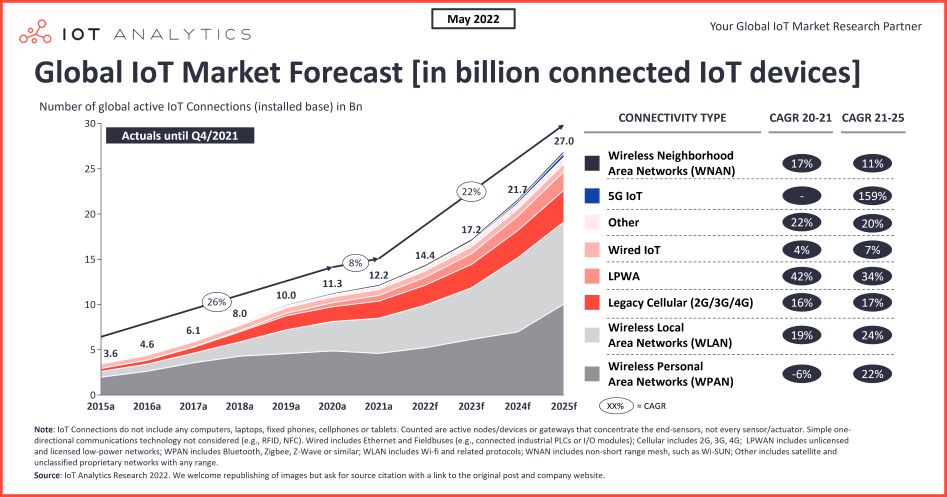The Impact of IoT on Mobile Development

Mobile apps and the internet of Things (IoT), two key technological enablers in today’s times promise higher efficiency when working together. Let’s find out the changes that IoT is introducing to app development, making it enterS a new phase.
IoT has seen a significant rush in the technological era in recent times. And when powered by the capabilities of mobility, the technology is creating new milestones in innovation, business performance, and user experience. Developers have started to build apps that can ease users’ needs and provide them instant access to the desired features.
Today, more than two-thirds of the global population uses mobile phones, spending an average of 3 hours and 15 minutes daily on them. No wonder, mobile apps have grown quite powerful and widespread over the last few years and, with time, have started to witness the influence of the Internet of Things (IoT) on the mobile app development process.
IoT developers are encouraging a new scale of innovation that can make any mobile device or gadget with end user at any location to work as an integral part of the IoT ecosystem. This is an emerging wave that has begun to impact the way end-users live and work.
Also, Read: Types of sensors in IoT
Regarding the perfect example of IoT and mobile app integration, we have a Wi-Fi-enabled thermostat for homes or offices. The mobile app developed acts as the gateway or remote that controls the device, while the thermostat is the IoT endpoint.
It’s not vague on how IoT has impacted the mobile industry. We move on to analyzing the impact that IoT is making.

Source: IOT Analytics
Concentrated Human Effort
The impact of Internet of Things is such that it embeds multiple devices and apps and functions as one system managing all. For instance, mobile devices with IoT functionality let you switch on the light or track the cab or check the security camera.
Hence, IoT has eventually made it easier for developers and end users. While users can manage all from one single device enabled with IoT, this has also reduced the effort developers put into building an app. The earlier time to make one app is now used to build multiple apps without hassle.
Integrating the power of the internet with devices, IoT technology has been able to manage a lot of tasks for users.
The Shift in Focus
Earlier, app developers primarily concentrated on building user-friendly apps. However, a significant shift has occurred with the rise of IoT technology. Nowadays, app developers are placing greater emphasis on building IoT-integrated apps.
To remain competitive and meet users’ expectations, it has become essential to consider factors that enhance user experiences and incorporate updated technology. Market demands and user preferences take precedence, driving the development of apps seamlessly integrating IoT functionalities and simplifying users’ lifestyles.
Integrating IoT in app development opens new possibilities for innovative and interconnected solutions. By combining the power of mobile apps with IoT devices, developers can offer users personalized experiences, real-time insights, and effortless control over their connected devices.
Centralized App
IoT has welcomed several opportunities and possibilities with its arrival. It has focused on providing a centralized platform to end users to manage multiple devices. This has improved cost-effectiveness and ease of management for the end users and the app developers.
Beacon technology (a technology embedded with IoT tied to a respective location) is a good example of how apps can be rendered a centralized character. When a user enters his house, beacon technology in mobile apps emits signals and prompts notifications or alerts to perform tasks like switching on lights, checking security cameras, etc.
Welcome Hybrid Apps
In the quest for innovative solutions, hybrid apps have emerged as a popular choice among businesses. With the increasing demand for technology-driven experiences, these apps combine the best of both worlds by blending current UI/UX platforms with cutting-edge coding techniques.
Adopting hybrid app development allows businesses to deliver more innovative and versatile solutions that cater to modern user demands. By fusing familiar user interfaces with advanced technology, these apps offer a seamless and engaging experience, capturing users’ attention in today’s fast-paced digital landscape.
High-end Security
IoT allows an unprecedented amount of entry points that can threaten the security of the apps. It becomes easier for cybercriminals to exploit the data and use them in unethical ways. App developers need to be focused on enhancing their cybersecurity knowledge to eradicate any possibility of cybercrime.
It’s essential to focus on building an IoT-entrenched mobile app that is safe, secure and user’s privacy is not hampered at any stage. As security is paramount, leave no stone unturned to bolster it; seek expertise from a trusted IoT app development company so that you are assured of a robust IoT framework.
Businesses have started to run IoT-enabled devices, ensuring an extra layer of security. Since no enterprise wants to face the threat of cyberattacks, security has always been the key discussion point in developing IoT mobile applications.
Still, IoT can help improve the defense barriers by enforcing physical devices to become the first point of entry, thus saving the core and alarming professionals about the threat.
Insights through Collection and Analysis
With the proliferation of IoT devices, mobile apps can now gather extensive data and present it meaningfully to users. For instance, fitness apps can seamlessly connect to wearable devices, capturing activity levels, heart rate, sleep patterns, and beyond data. This wealth of information serves as a treasure trove for developers, enabling them to offer personalized insights and recommendations to users.
With the integration of IoT data, mobile apps now have the power to deliver a more immersive and tailored experience to users. By presenting meaningful analytics and actionable information, these apps empower users to make informed decisions about their health and well-being. This data-driven approach enhances the user experience and enables developers to create apps that foster deeper user connections.
Profit from Data
The data generated by IoT devices has become a valuable asset for mobile app developers, presenting exciting opportunities to make money. By collecting and anonymizing this data, businesses can offer valuable insights and analytics to other companies, creating new revenue streams.
This data, stripped of personal information, provides valuable knowledge about customer behavior and market trends. App developers can boost their earnings beyond their app’s main features by selling these valuable insights to trusted partners.
Boost Brand Recognition
IoT brings exciting cost-efficiency to building mobile apps, offering a win-win scenario for brands and users. With IoT’s seamless integration, app creators can add diverse elements at a lower expense, making apps more interactive and innovative without breaking the bank.
Using IoT, mobile apps can deliver unique and personalized experiences to users, fostering strong brand recognition and loyalty. Imagine having an app that tailors services for you and provides real-time insights! This enhances a brand’s identity and keeps users coming back for more.
Industry-Specific Solutions
IoT-powered mobile apps are revolutionizing various industries like healthcare, transportation, agriculture, and smart cities. These industry-specific solutions profoundly impact the app development process, creating a seamless synergy between technology and sector-specific requirements.
For instance, IoT in Retail industry has powered apps that optimize inventory management and supply chain operations, offering real-time tracking and enhanced efficiency. Healthcare apps integrated with IoT provide remote patient monitoring, personalized health insights, and better medical device management.
Financial apps leveraging IoT ensure secure transactions, fraud detection, and personalized financial services. In agriculture, IoT-powered apps empower farmers with intelligent irrigation systems, crop monitoring, and improved livestock tracking.
With the seamless integration of IoT technology, mobile app developers can precisely address the unique needs of various industries, unlocking transformative benefits. The sync between IoT-powered mobile apps and industry-specific demands drives innovation, productivity, and informed decision-making, creating an impact of IoT in the future where technology and industries thrive in perfect harmony. To build industry-specific mobile apps, it is always a good choice to rope in experts from an experienced mobile app development company.
Cross-Platform Compatibility
The impact of Internet of Things on application development is remarkable, as it empowers developers to create apps that work seamlessly across various platforms and operating systems effortlessly. This means users can access the app from their favorite devices without hassle.
Thanks to IoT integration, developers can streamline app development, saving valuable time and resources. Gone are the days of developing separate app versions for different platforms; now, they can focus on creating a single app that caters to a broader audience.
The impact of iot platform allows mobile applications to be cross-platform compatible, resulting in consistent and seamless user experiences regardless of the device used. This increases user satisfaction and engagement resulting in the app’s popularity among a wide range of users.
Facilitates seamless integration
IoT technology harmoniously intertwines with emerging tech like Machine Learning (ML), Augmented Reality (AR), and Virtual Reality (VR). This fusion extends to software development, where these capabilities can be harnessed. However, for optimal outcomes, you must take care of all IoT implementation challenges. As if this is done properly then there’s a prime opportunity for IoT-focused app development companies to assemble applications that leverage this synergy.
Consider a scenario where an IoT-powered health app integrates with ML algorithms to provide personalized health insights. This amalgamation utilizes IoT data from wearable devices to offer precise recommendations, enhancing the user’s wellness journey.
Additionally, the app could leverage AR to visualize exercise routines and VR to simulate immersive wellness environments, fostering engagement.
Priorities in UX/UI design
The intricate nature of IoT technologies and the diversity of system components result in distinct UX/UI designs for mobile IoT apps compared to traditional ones. IoT encompasses numerous devices with varying interfaces crafted to interact with each other and users.
Considering this, IoT app design demands a unified strategy to deliver a smooth experience within the app and throughout the entire IoT environment.
Furthermore, the UX/UI design should be exceptionally intuitive, ensuring users feel at ease while engaging with smart devices, even if they’re newcomers to this interaction. This approach aims to make the complexities of IoT feel approachable, enhancing user comfort and engagement.
Cost-effective solutions
IoT offers a cost-efficient solution that resonates strongly with businesses looking to strengthen their brand while reducing costs. Developers strategically integrate a multitude of components, ensuring cost-effectiveness remains paramount. Moreover, the resultant applications don’t merely adhere to budget constraints but also enhance interactivity, providing users with immersive experiences.
For example, an IoT-enabled retail app uses beacon technology to offer personalized discounts to customers while shopping. This simplified integration increases user engagement and reduces costs by taking advantage of IoT’s targeting marketing capabilities.
Therefore, development of IoT into mobile app development encompasses both domains of ambition: increasing brand presence and streamlining operations. This combination of innovation and cost-efficiency demonstrates how IoT significantly contributes to the modern app development landscape, creating a mutually beneficial situation for both businesses and users.
Conclusion
Having all the points considered, it’s very apparent that the impact of IoT in future will bring a prominent digital revolution in the technology industry! It was introduced when the users sought advanced technology that understands their needs and increases their convenience. Undoubtedly, the IoT in mobile apps has seen a rise in the market in all sectors.
If you desire to develop a mobile app seamlessly integrated with IoT but are still determining where and how to begin, fret not. Seek assistance from Finoit, a premium software development agency. Our development experts are ready to guide and support you throughout the app development journey.
Connect with our development experts today to unlock the full potential of IoT-powered mobile apps and offer users unparalleled experiences that elevate your business to new heights.
Need Help with IOT-
driven App Development?
- Proven
- Transparent
- Dependable
